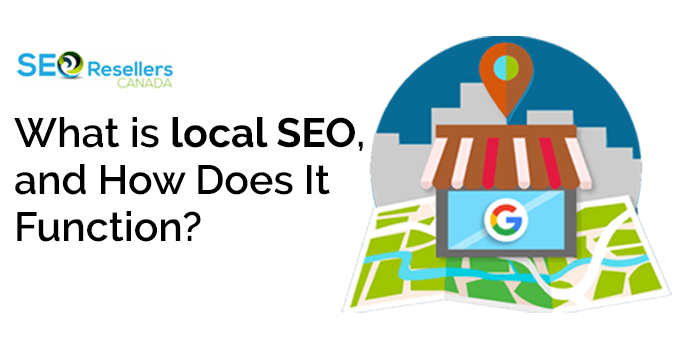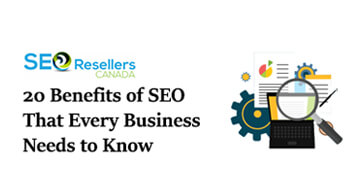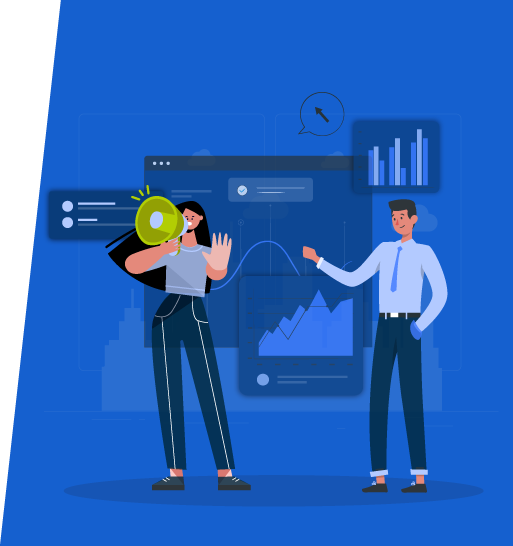In recent years, a notable transformation has taken place within the digital marketing landscape, with a groundbreaking technology at its epicenter: Artificial Intelligence (AI).
As reported by Markets and Markets, the AI in marketing sector is poised to achieve an astounding $40.09 billion by 2025, driven by an impressive Compound Annual Growth Rate (CAGR) of 29.7%. This remarkable surge underscores AI’s growing importance in reshaping how businesses interact with their online audiences.
SEO outsourcing has made an indelible impact on the realm of digital marketing. It has fundamentally altered how marketers plan, execute campaigns, and gauge their effectiveness.
It’s no longer a question of whether AI will find its place in marketing; instead, it’s about the extent to which it will seamlessly integrate into all aspects of the field.
This blog aims to investigate why digital marketers are excited about AI for digital marketing. We’ll explore how AI revolutionizes marketing strategies, enhances customer experiences, and streamlines data-driven decisions.
When you conclude this journey, you will understand why AI has become the prevailing buzzword in the ever-evolving realm of digital marketing.
1- Understanding AI in Digital Marketing
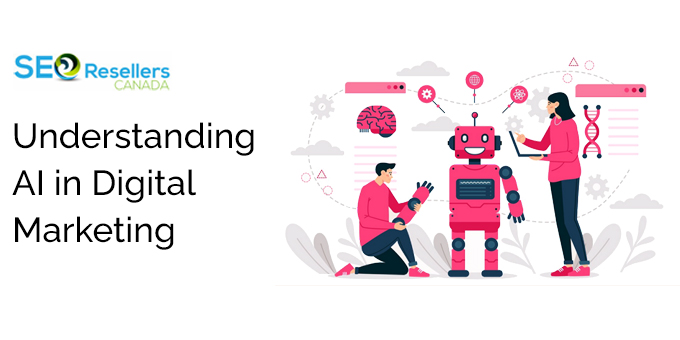
1.1- Defining artificial intelligence in the context of digital marketing
Artificial intelligence, often referred to as AI, plays a vital role in SEO consulting by utilizing computer systems to execute tasks that have traditionally relied on human intelligence.
AI for digital marketing involves deploying advanced algorithms and data-driven methods to automate various campaign components, enhancing efficiency and precision.
1.2- Types of AI commonly used in digital marketing.
1.2.1- Machine Learning
Machine learning, as one of the beneficial subsets of AI for digital marketing, empowers computers to learn from data and make predictions or decisions without explicit programming. In digital marketing, machine learning algorithms can optimize ad targeting, personalize content, and recommend products to individual users, highlighting the benefits of AI for digital marketing. According to Adobe, companies using machine learning in marketing see an average 14.6% uplift in sales.
1.2.2- Natural Language Processing (NLP)
NLP focuses on enabling computers to understand, interpret, and generate human language. In digital marketing, NLP is employed for sentiment analysis, chat bots, and content optimization. For instance, Hubspot reports that 71% of consumers prefer using chat bots for quick communication with brands.
1.2.3- Predictive Analytics
Predictive analytics, one of the significant benefits of AI for digital marketing, utilizes historical data and statistical algorithms to forecast future trends and outcomes. In the context of digital marketing, this powerful AI-driven tool helps in lead scoring, churn prediction, and campaign performance forecasting.
According to Forbes, companies using predictive analytics are 2.9 times more likely to experience sales growth of over 10%.
1.3- The role of AI in enhancing marketing strategies.
AI plays an important role in revolutionizing marketing strategies. It allows marketers to:
– Segment audiences more effectively, increasing the relevance of marketing campaigns.
– Automate repetitive tasks such as email marketing, freeing up time for strategic thinking.
– Analyze vast datasets to gain insights into customer behavior and preferences.
– Personalize content and recommendations, leading to higher conversion rates.
– Optimize advertising spend by targeting the right audience at the right time.
The infusion of AI into marketing strategies is transforming how AI is changing digital marketing, as it not only boosts efficiency but also delivers more personalized and engaging experiences for customers, ultimately driving better ROI for businesses.
2- Data-Driven Decision Making
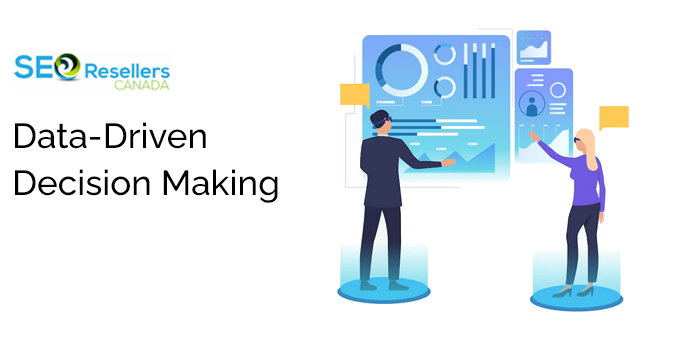
2.1- The critical importance of data in digital marketing.
In an era where customers are more connected and information-savvy than ever, how AI is changing digital marketing is evident. Digital marketing depends on data to function, and businesses increasingly rely on AI-powered data analysis to make wise decisions and efficiently adjust their marketing tactics.
A survey by Adobe found that 74% of marketers prioritize data-driven marketing because they recognize its critical role in comprehending consumer behavior and preferences.
2.2- How AI enables data analysis and interpretation at scale.
The volume and complexity of data available to marketers can be overwhelming, making manual analysis virtually impossible. This is where AI steps in. AI-powered algorithms can swiftly process vast datasets, extracting meaningful insights, patterns, and trends. For instance, Salesforce reports that 61% of marketers believe AI helps identify hidden opportunities in data.
2.3- Case studies of successful data-driven marketing campaigns empowered by AI.
1. Netflix: Netflix, the streaming giant, leverages AI to analyze user viewing habits and preferences. This data-driven approach is used to recommend personalized content to its subscribers, contributing to a reported 80% of content discovered through its recommendation system.
2. Spotify: Spotify utilizes AI to curate playlists and recommend music to its users. Their AI-driven algorithms analyze listening behavior and user-generated playlists to create personalized music experiences. This approach has helped Spotify grow its user base to over 345 million monthly active users worldwide.
3. Amazon: Amazon’s AI-driven recommendation engine is estimated to drive 35% of its total revenue. While analyzing customer behavior, browsing history, and purchase patterns, Amazon suggests products to users, leading to increased sales and customer loyalty.
These case studies demonstrate the transformative power of AI in data-driven marketing. AI not only helps businesses better understand their customers but also enables them to deliver tailored experiences that drive engagement and conversions, ultimately leading to increased revenue and brand loyalty.
3- Personalization and Customer Experience
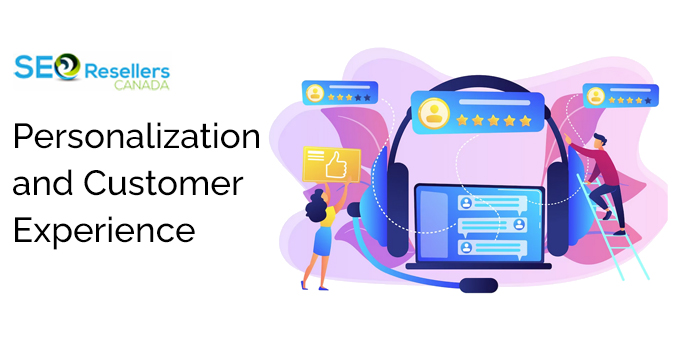
In today’s hyper-competitive digital landscape, Personalization has become the Holy Grail of marketing. Customers now anticipate customized offerings that speak to their individual interests and demands. The customer experience is being elevated to previously unheard-of levels as a result of AI’s critical role in fulfilling these expectations.
3.1- The significance of personalized marketing in today's landscape.
The statistics underscore just how vital personalized marketing has become:
1. According to a study by Epsilon, 80% of consumers are more likely to make a purchase when brands offer personalized experiences.
2. Salesforce reports that 52% of consumers are likely to switch brands if a company doesn’t personalize communications with them.
3. Research by Segment found that 44% of consumers say they will likely become repeat buyers after a personalized shopping experience.
3.2- How AI helps in creating personalized content and recommendations.
AI leverages vast amounts of customer data to craft personalized experiences that were once unimaginable:
1. Amazon’s AI-powered recommendation system accounts for a large percentage of its revenue. According to estimates, personalized product recommendations account for 35% of Amazon’s total sales.
2. The fact that streaming services like Netflix and Spotify mainly rely on AI algorithms to make content recommendations is no accident given their remarkable subscriber counts: While keeping subscribers through personalized content, Netflix’s recommendation engine is thought to save the corporation $1 billion yearly.
3.3- Improving customer experience through AI-driven chat bots and virtual assistants.
3.3.1- Chat bots and virtual assistants are revolutionizing customer service:
1. Gartner predicts that by 2023, 40% of customer service engagements will be handled by virtual customer assistants.
2. The National Retail Federation reports that AI-driven chat bot scan answer up to 80% of customer questions, significantly improving response times and customer satisfaction.
3. Zen desk reveals that companies using AI-powered customer service saw a 10% increase in customer satisfaction scores.
In a world where customers crave Personalization and efficient interactions, AI is the engine driving the transformation of marketing and customer experience. Its ability to analyze data, make real-time decisions, and provide tailored content and support is propelling brands to new heights in customer satisfaction and loyalty.
4- Automation and Efficiency
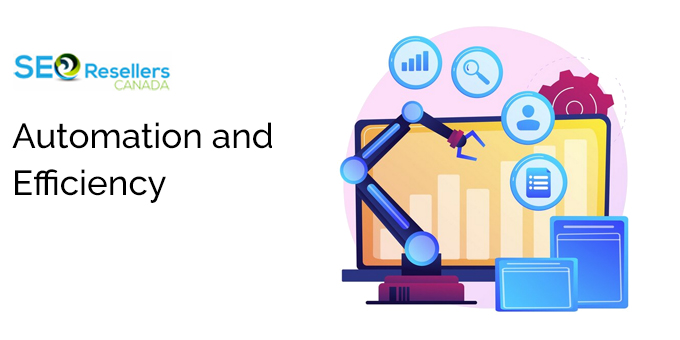
4.1- The Role of AI in Automating Repetitive Tasks
In the fast-paced world of digital marketing, time is a precious resource. This is where AI steps in as a game-changer. It excels at handling repetitive and time-consuming tasks with remarkable efficiency. Consider the following statistics:
4.1.1- Email Marketing
According to a study by the DMA, automated email campaigns generate a staggering 320% more revenue than non-automated ones. AI-powered email marketing tools can segment audiences, personalize content, and optimize send times, all autonomously.
4.1.2- Social Media Posting
HubSpot reports that businesses using AI-driven social media tools save an average of six hours per week on social media management. These tools can schedule posts, analyze engagement, and even suggest content ideas.
4.2- Examples of Marketing Processes Streamlined by AI
The applications of AI in streamlining marketing processes are diverse and impactful:
4.2.1- Content Creation
AI-powered content generators like GPT-3 can produce blog posts, product descriptions, and social media updates, reducing the time and effort required to create engaging content.
4.2.2- Ad Campaign Optimization
Online advertising platforms, such as Google Ads and Facebook Ads, use AI to automatically adjust bids, target audiences, and optimize ad creatives to maximize ROI.
4.2.3- Customer Support
AI-driven chat bots and virtual assistants can provide instant responses to customer inquiries, enhancing the customer support experience while freeing up human agents for more complex tasks.
4.3- The Cost and Time-Saving Benefits of Automation
The adoption of AI-driven automation brings significant cost and time-saving advantages:
4.3.1- Cost reduction
According to a PwC report, AI can save expenses for businesses by up to 30% by 2030, with marketing automation accounting for a sizable chunk of these savings.
4.3.2- Time Efficiency
In accordance with Salesforce, marketers who employ AI-powered automation experience a 44% boost in lead production and a 45% reduction in time spent on activities like data entry and analysis.
4.3.3- Scalability
Automation allows marketers to scale their efforts efficiently. Whether it’s launching targeted email campaigns to thousands of subscribers or managing social media across multiple platforms, AI can handle the volume seamlessly.
5- Targeted Advertising
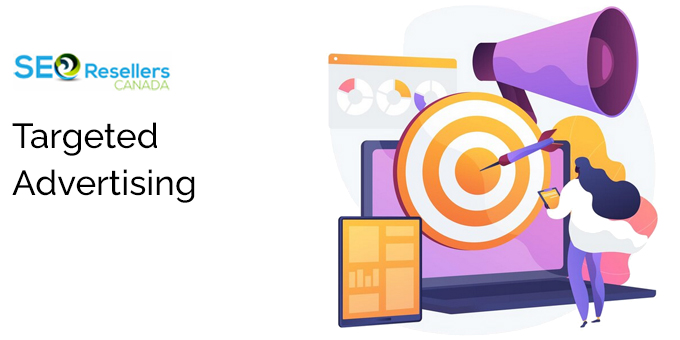
In the realm of digital marketing, precise audience targeting is the holy grail for achieving higher conversion rates and maximizing ROI. AI has emerged as the indispensable tool that digital marketers rely on to revolutionize their advertising strategies. Here’s why:
5.1- How AI enhances audience segmentation and targeting
Statistics: According to a Statista survey, 71% of marketers say that personalisation based on AI-driven data is critical to accomplishing their marketing goals.
AI has altered audience segmentation, which was previously a time-consuming and often incorrect operation. Because machine learning algorithms can analyse large information in real time, marketers may generate very detailed customer profiles. This level of detail enables the development of laser-focused ad campaigns that appeal to specific audience segments.
5.2- The effectiveness of AI-driven ad campaigns
Statistics: In a survey conducted by Salesforce, 61% of marketers reported a significant improvement in their overall marketing effectiveness due to AI adoption.
AI’s ability to analyze data and predict consumer behavior translates into more effective ad campaigns. AI-driven systems continuously learn and adapt to changing trends, ensuring that your advertisements are always optimized for maximum impact. This results in higher click-through rates (CTR), improved conversion rates, and ultimately, a healthier bottom line.
5.3- Adapting to changing consumer behavior with AI
Statistics show that 60% of marketers are using AI to predict changes in consumer behavior, allowing them to alter their tactics in real time, according to Deloitte.
Consumer behaviour is fluid, and marketers must keep ahead of the curve. Artificial intelligence assists in this area by monitoring and analysing customer behaviour patterns, allowing marketers to alter their ads on the fly.
AI guarantees that your advertising approach remains nimble and adaptable, whether it’s responding to altering trends or reacting to unanticipated market events.
AI is not simply a luxury in the constantly changing world of digital marketing; it is a requirement for companies that want to stay competitive and effective. It is a crucial tool for contemporary digital marketers because of its capacity to improve audience targeting, increase campaign efficacy, and adjust to shifting customer behavior.
6- Predictive Analytics for Marketing
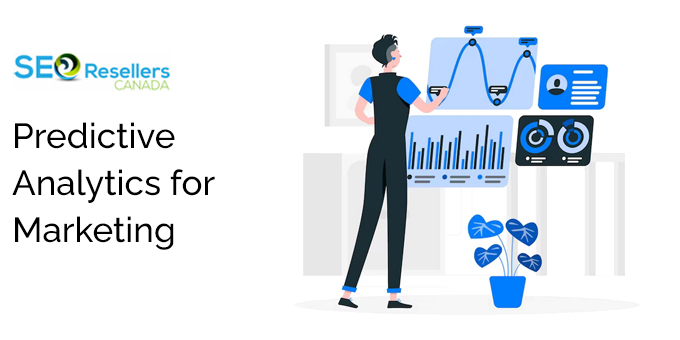
6.1- The Power of Predictive Analytics in Understanding Customer Behavior
Predictive analytics is like a crystal ball for digital marketers, offering profound insights into customer behavior and preferences. While analyzing historical data, predictive analytics uses statistical algorithms to forecast future trends and behaviors. This capability is invaluable for marketers aiming to understand their audience’s actions, needs, and desires.
Stat: According to Forbes, 86% of marketers reported that predictive analytics played a crucial role in their overall marketing strategies, leading to a 25% increase in sales and a 20% reduction in marketing costs.
6.2- How AI-Driven Predictive Models Work
Artificial Intelligence-driven predictive models are at the heart of this marketing revolution. These models are trained on vast datasets, allowing them to identify patterns and correlations that humans might miss. They can predict various outcomes, from which products a customer is likely to purchase to when they’re most likely to make a purchase.
Stat: According to a Deloitte survey, 68% of organizations have seen a significant rise in income after integrating AI for predictive analytics in their marketing activities.
6.3- Leveraging Predictive Analytics for Better Campaign Planning
When it comes to campaign planning, predictive analytics gives marketers a competitive edge. While understanding what their audience is likely to do, marketers can tailor their campaigns with precision. This means sending the right message, at the right time, through the right channels. It minimizes wastage of resources and maximizes the chances of success.
Stat: According to a study by Adobe, companies using predictive analytics for campaign planning saw a 73% increase in click-through rates and a 68% increase in conversion rates compared to those who didn’t utilize predictive analytics.
Incorporating predictive analytics into your marketing strategy can be a game-changer, allowing you to stay one step ahead of customer behavior and make data-driven decisions that lead to better campaign outcomes.
7- Conclusion
In the ever-evolving landscape of digital marketing, AI has emerged as a game-changer with the power to revolutionize the way brands connect with their audiences. The hype surrounding AI in digital marketing is far from unwarranted.
Throughout this blog, we’ve delved into the reasons behind this excitement, highlighting how AI is reshaping marketing strategies in profound ways.
From harnessing the potential of data-driven decision-making to creating highly personalized customer experiences, AI offers a toolkit that enables marketers to stay ahead of the curve.
Its ability to automate tasks, target audiences with pinpoint accuracy, and provide invaluable predictive insights is changing the game for digital marketers.
However, it’s important to remember that with great power comes great responsibility. As AI adoption continues to surge, ethical considerations and responsible AI practices must remain at the forefront of marketing strategies. Balancing the benefits of AI with ethical concerns will be essential for the long-term success of AI-driven marketing efforts.













